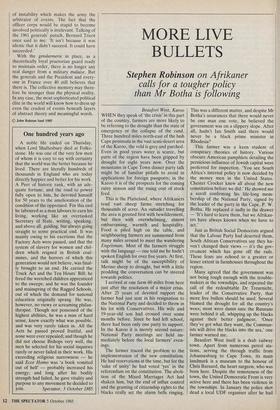One hundred years ago
A noble life ended on Thursday, when Lord Shaftesbury died at Folke- stone. He was one of the very few men of whom it is easy to say with certainty that the world was the better because he lived. There are literally hundreds of thousands in England who are today directly happier and better for his work. A Peer of historic rank, with an ade- quate fortune, and the road to power fully open to him, he devoted himself for 50 years to the amelioration of the condition of the oppressed. For this end he laboured as a man labours to earn his living, working like an overtasked Secretary of State, writing, speaking, and above all, guiding, but always going straight to some practical end. It was mainly owing to his exertions that the Factory Acts were passed, and that the system of slavery for women and chil- dren which reigned in British coal- mines, and the horrors of which this generation would not believe, was final- ly brought to an end. He carried the Truck Act and the Ten Hours' Bill; he freed the wretched children apprenticed to the sweeps; and he was the founder and mainspring of the Ragged Schools, out of which the demand for national education originally sprang. He was, however, no viewy or screaming philan- thropist. Though not possessed of the highest abilities, he was a man of hard sense, knew exactly what was possible, and was very rarely taken in. All the Acts he passed proved fruitful, and none were ever repealed; and though he did not choose Bishops very well, the men he selected for his social inquiries rarely or never failed in their work. His exceeding religious narrowness — he said Ecce Homo was 'a book vomited out of hell' — probably increased his energy; and long after his bodily strength had failed, he gave vitality and purpose to any movement he decided to join. Spectator, 3 October 1885


























































 Previous page
Previous page